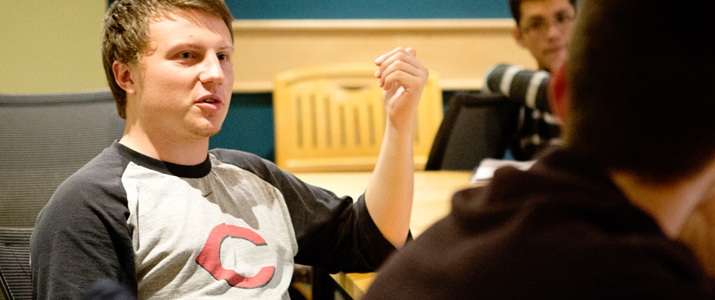About Classics & Religious Studies
The Department of Classics & Religious Studies offers three interrelated programs: Classical Languages (Greek and Latin), Classical Civilization/Archaeology, and World Religions.
From the Department Chair
Welcome to the Classics & Religious Studies Department. One of the most common questions I receive from students contemplating a major is "What does this department do?" We study the texts and artifacts produced by people living in the civilizations of the ancient Mediterranean and areas further east where major religions of Judaism, Christianity, Islam, Buddhism, and Hinduism originated. We also examine how those civilizations and their beliefs have affected our modern perceptions of the world both within the United States and abroad.
Why Major in Classics or Religious Studies?
The simple answer is because our courses are about fascinating foreign cultures that introduce new ideas and ways of thinking about the big questions of human existence:
- What does it mean to be human in different places and times?
- What are the root factors behind the differences that characterize various cultures?
- How do religious beliefs shape cultural choices?
- How do different classes of people interact within a culture and why?
These are the types of questions that we ask in all three of our major tracks: Classical Languages, Classical Civilization, and World Religions. Most of our classes are small and are taught by professors who come to know their students personally, which creates a more comfortable space for discussions of the sometimes controversial issues that arise in the examination of human behavior.
The more complex answer deals with the types of skills one learns while attempting to answer the big questions. The study of both classics and world religions are part of the "humanities," an umbrella term that has been described as "how people process and document the human experience." We are dealing with human beliefs, emotions, and interactions, but how do we study these objectively? It's all about the evidence! We examine what people wrote, the cities in which they lived, their objects of daily life, and even inscriptions on their tombstones. Sometimes we only have fragments of surviving evidence, so the challenge (and the fun) is to figure out how to put a partial puzzle back together to create an overall understanding of the culture. In doing so, we all learn much about our own preconceptions, which then allows us to see outside ourselves.
Ultimately as teachers, our goal is to create greater empathy in our students so that they better understand different points of view, which is critical for advancement into leadership roles in the workplace. By learning how people have approached problems in different ways throughout history and in diverse cultures, students expand their knowledge base and develop habits of thinking that open doors onto more creative approaches to problem solving.
What Do Majors from Our Department Do after They Graduate?
As in other humanities disciplines, the options for our majors are broad and limited only by their own imaginations. Our major tracks are not intended to prepare students for particular jobs but to impart the mental agility to tackle any job. Our majors have gone on to work as lawyers, doctors, Latin teachers, field archaeologists, grant writers, business owners, authors, professors, and ministers.
If you would like to read more about the benefits and prospects of humanities majors, here are a few articles:
- Your College Major May Not Be As Important As You Think
- Classics Majors Find Their Future in the Past
- Why Study Religion?
- Forbes: "That 'Useless' Liberal Arts Degree Has Become Tech's Hottest Ticket"
- The Atlantic: "Study Theology, Even if you Don't Believe in God"
- YouTube interview: Martha Nussbaum on the Value of the Humanities
Classics & Religious Studies Student Learning Outcomes
Student learning assessment at the program level is intended to promote and maintain program excellence and improve student learning. Each department in the College of Arts & Sciences has developed a set of learning outcomes for their programs and engages in faculty-led assessment activities to help inform curricular and program review and development. Student learning is assessed in different ways across A&S departments, informed by disciplinary standards and the specific learning outcomes of the program.
